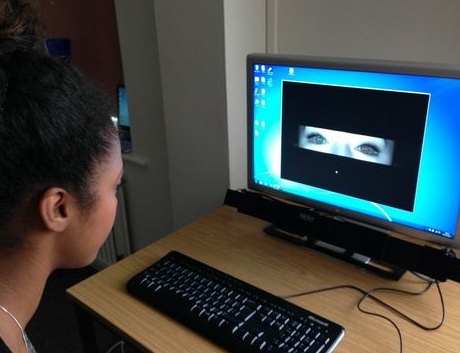Eye-tracking for advertising? MBA alumnus Mike Follett talks digital business

Business School graduate Mike Follett is the founder of Lumen, a company that uses eye-tracking software to help advertisers grab people's attention.
Lumen, which was founded by Mike in 2013, uses cutting edge eye-tracking techniques to measure the impact of visual communications. Mike and his team help publishers, advertisers and their agencies to gain better insight into what material keeps and loses people’s attention.
Mike, who graduated from the Full-Time MBA programme in 2013, spoke to Laura Singleton about his inspiration for creating the company, how eye-tracking technology works and what attracted him to a career in the world of digital media.

What is eye-tracking and how can it help businesses improve their communications (marketing, advertising etc)?
Eye-tracking is a technology that measures people’s eye movements on a screen. At Lumen this is done through an eye-tracking camera attached to a laptop or computer which monitors the movements of people’s eyes through coloured patterns displayed on the screen. These coloured patterns show us exactly how people view an advert – which areas they are drawn to on a page or screen and what this reveals about the impact of the visual material and allow us to analyse people’s reactions. We then collect the data and present this with a report to our clients, outlining the areas that need to be addressed so that companies can make any changes to their material before it goes live.
How did Lumen come about?
Before I came to Imperial to study for my MBA I had worked in advertising for 13 years. I worked on a lot of high profile campaigns for big brands but never saw if the adverts we were making were having any impact on the public. Could people remember the adverts they had seen and how could we measure this using technology? This inspired me to come up with the business idea for Lumen during my studies at Imperial.
During my time at Imperial I benefitted from being exposed to new ideas on how technology could benefit business, which helped fuel my imagination to create a business that would solve a create problem by applying the latest eye-tracking techniques with big data and advertising expertise.
After graduating from Imperial, I approached Tesco, an old client from my previous advertising career, to be the first company to use Lumen’s services. Tesco wanted to see how people engaged with their newspaper advertising, so they came to us with a full page advert, which we then analysed using the eye-tracking technology. We’ve since done further projects for companies including BT, British Gas, Vodafone, Tesco, Samsung and E.ON.

Why did you decide to study for an MBA at Imperial?
I’m fascinated by learning and saw the MBA at Imperial as the perfect opportunity to learn more about business theory while learning new skills and gaining new experiences that would help my future career path. As a former humanities graduate, I was attracted to studying at Imperial because of its reputation as a world-leading science and technology university and for its links to industry within London.
Describe your experience of studying at Imperial
Studying at Imperial College Business School was an incredible experience. Although I came to the degree with a long work history, the Business School exposed me to new ideas and approaches to business that I had never come across previously. I loved the combination of the academic and practical elements of the programme and took a lot of inspiration from my tutors and other students.
I had always planned to create my own business following graduation from the MBA, but the Business School gave me the confidence to turn the idea of Lumen into a real business – otherwise, it may have just remained an idea!
What specific skills and experience have you brought from your experience at Imperial to your current role?
The MBA at Imperial teaches you to be a good overall manager and teaches you to appreciate the skill sets of other people within different areas of business such as accountants, HR etc. It gave me renewed respect for people who work in these areas and insight into areas of business that I didn’t understand previously. I also learned some valuable lessons about leadership and found the theory on business, sociology and consumer behaviour very useful.
What type of skills do you need to work at Lumen?
The world of digital media provides opportunities for a wide range of skills sets and experience and at Lumen we often experience a lot of fun and creative tension between the different disciplines. We currently employ an eye-tracking expert who has an engineering software degree, as well as specialists in big data and people with business and advertising backgrounds. Lumen’s success depends on having the right combination of people, who work well together and share the same vision for the company.
What are your ambitions for developing the business?
We are shortly planning to open further offices in New York and Germany and expand the business more into the area of big data and machine learning. We are also working on a project to help people better engage with text to help us gain more insight into people’s reading and viewing habits.
Article text (excluding photos or graphics) © Imperial College London.
Photos and graphics subject to third party copyright used with permission or © Imperial College London.
Reporter
Laura Singleton
Communications Division